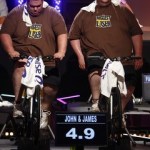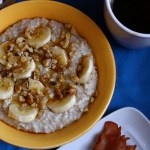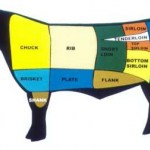nutrition
NBC's "Biggest Loser" has become a phenomenon, with over 10 million regular viewers. There is no doubt that this show delivers dramatic entertainment. Sagas about victory of the human spirit, against all odds, are timeless. With the final four contestants being featured next week, I would like you to consider the message that this show coveys.
Public embarrassment defines much of today's entertainment - consider the sharp wit of "The Office". The German term, Schadenfreude, expresses it well - deriving pleasure from the misfortunes of others. On the "The Biggest Loser", each contestant…
There's a debate going on in The Economist. Pamela Ronald is defending the proposition that biotechnology and sustainable agriculture are complementary, not contradictory, which is weird: agriculture is biotechnology, and just breaking ground with a sharp stick and throwing some seeds in is an example of an 'unnatural' human practice. I don't understand how the opposition can make a case, especially when this is their opening statement:
Biotechnology is not a system of farming. It reflects no specific philosophy nor is it guided by a set of principles or performance criteria. It is a bag of…
The Washington Post's Jane Black gives us a heads-up about the forthcoming update to the Dietary Guidelines for Americans. Every five years, USDA's Center for Nutrition Policy and Promotion issues new dietary guidelines based on analysis by the Dietary Guidelines Advisory Committee, a group of scientific experts appointed by the Secretaries of HHS and USDA. Here's how the Dietary Guidelines for Americans 2005 publication explains the guidelines' role:
The intent of the Dietary Guidelines is to summarize and synthesize knowledge regarding individual nutrients and food components into…
Image by thebittenword.com
Last year I posted results from a study which suggest that having a breakfast high in fibre may be more satiating for a smaller number of calories, and thus may be one important way to help manage hunger and thus caloric intake. Today I came across another new study which suggests that a breakfast high in fibre and with a low glycemic index (the degree to which an ingested food causes a spike in blood glucose levels) may enhance fat oxidation during a subsequent bout of exercise.
In this small study published in the Journal of Nutrition, 8 young and sedentary…
Image by love janine.
Although this may surprise some of our readers, I really like junk food. I eat far too much pizza, I love chicken wings, and Nutella, the original chocolate hazelnut spread, is one of my favourite breakfast condiments (it's tasty on a bagel, but its unbeatable inside a fresh crepe with whipped cream and bananas). The interesting thing about Nutella is that its commercials seem to suggest that it is some sort of health food. For example, check out the French Nutella commercial below (for our email subscribers, click on the title of today's post to view the video…
This is the first I've heard of this, but there is a devastating disease called Plum Pox Virus that kills trees bearing stone fruits, like plums and peaches, and the only way to deal with infected plants is to rip them out of the ground and destroy them. There has been a recent outbreak in Pennsylvania; don't rush out to buy the last of the fruits in an apocalyptic terror, it's just a hint of a potential problem for the future, but you can worry a little bit. And maybe you can promote some science that will help.
A new variety of plum called the Honey Sweet has been genetically engineered…
From the Obesity Panacea Archives: The following post first appeared on January 11, 2010.
In the past year or so I've seen lots of online discussion about the nutritional value of juice, and the role that it may play in obesity and weight management. Although there are a lot of good nutritional arguments against juice consumption, they are all a bit abstract (for a quick review of the main arguments, click here). We can tell people again and again that orange juice is the nutritional equivalent of Coke, but when they look at at a glass of orange juice, it still looks like a…
Image by Jeff Keen.
In the past few years several prominent researchers have argued for the adoption of taxes on junk food as a means of reducing their consumption. Often, as in a recent editorial in the New England Journal of Medicine, the argument is made that money collected through the tax could then be used to subsidize healthier foods. This is an idea that I've found very appealing - we make the bad foods more expensive, the good foods less expensive, and people will probably shift at least some of their purchases to those healthier options. But a very…
tags: man drinking fat, NYC Health Anti-Soda Ad, Are You Pouring on the Pounds?, diet, nutrition, sports drinks, soda, sweetened drinks, television, disgusting, streaming video
Most people don't realize how easy it is to gain weight from drinking sugary sodas, juice drinks, sport drinks and sweetened tea and coffee drinks. Just one 20-ounce bottle of soda can pack 250 calories and more than 16 teaspoons of sugar. Is the lemon-flavored iced tea any better? Not by much with 210 calories and 14½ teaspoons of sugar. Sugar-sweetened beverages add hundreds of calories to your diet each day. Don't…
Resolutions are one thing, but change doesn't happen overnight. If you find yourself not living up to your goals, don't put them off for another year; regardless of the date on the calendar, every day is a chance to get something right. There is a growing buzz here on ScienceBlogs about health and fitness, and we invite all our readers and bloggers to join the discussion. ERV kicks things off, wondering why there aren't more scientific voices to guide those on the quest for personal health through the "minefield of woo" that promises miraculous ways to get in shape. Ethan Siegel responds on…
Although it is illegal to sell in most states, raw milk is gaining popularity as claims about its healthfulness multiply. Proponents of raw say the heat of pasteurization destroys beneficial enzymes and probiotic bacteria, while homogenization damages the natural structure of milk. Sharon Astyk drinks raw milk on Casaubon's Book, but only from animals she raises herself. She says raw milk "tastes better," "is easier to digest," and "should be available for sale everywhere." But she also acknowledges the inherent bacterial risks of rawness, warning that it is not for everyone and requires…
'Tis the season, time for many of us to eat as much as we swore we wouldn't. But before you cozy up beside the fire with a pound of chocolates and a quart of egg nog, see if these articles won't sate your appetite. First, on Casaubon's Book, Sharon Astyk cites a recent statistic that America wastes 40% of its food supply, and offers practical ways for us to improve our eating efficiency. Then on The World's Fair, Benjamin Cohen says that for sustainable eating to really take off, we must "reduce costs by reconfiguring price structures based on local economies." On Tomorrow's Table,…
If I say the phrases 'anti-ageing' and 'nutritional balance' to you, you'd probably think of the pages of quack websites selling untested supplements than the pages of Nature. And yet this week's issue has a study that actually looks at these issues with scientific rigour. It shows that, at least for fruit flies, eating a diet with just the right balance of nutrients can lengthen life without the pesky drawback of producing fewer offspring.
Despite the claims of the cosmetic and nutritional industries, chemicals or techniques that slow the ageing process are few and far between. We're a long…
We often hear that "you are what you eat," but the relationship between what goes in our bodies and what our bodies make of it is really quite complex. On Respectful Insolence, Orac laments that "diet does not have nearly as large an effect as we had hoped" on the prevention of cancer, and that by the time we reach adulthood, dietary interventions may be too late. Elsewhere, Joseph on Corpus Callosum examines a new study which suggests that drinking coffee lowers the risk of hepatitis C progression in afflicted individuals. Bucking the study's correlative conclusion, he says it's "not…
Apparently the average American gets ~17% of their calories a day from sugar. This varies by population segment:
The intake of added sugars was higher among men than women and inversely related to age, educational status, and family income. Asian Americans had the lowest intake and Hispanics the next lowest intake. Among men, African Americans had the highest intake, although whites and American Indians/Alaskan Natives also had high intakes. Among women, African Americans and American Indians/Alaskan Natives had the highest intakes. Intake of added sugars was inversely related to educational…
A child in the womb is not just some hapless creature waiting to be born into a world of experience. It is preparing. Through its mother, it senses the conditions of the world outside and its body plans its growth accordingly.
There is strong evidence that people who are under-nourished as embryos grow up to have higher risks of heart disease and other chronic illnesses. For example, people born to women during the Dutch Famine of 1945 had higher risks of coronary heart disease as adults.
We might nod our heads at this as if it were expected news, but it's actually quite a strange result…
Kenneth Chang, guest-blogging at TeirneyLab, laments the use of the word "organic" in both the contexts of organic chemistry and as a term for natural foods:
Organic derives from Greek, organikos. The original meaning was, logically, something related to an organ of the body. The meaning later generalized to "characteristic of, pertaining to, or derived from living organisms."
Nowadays, the most prevalent meaning of organic is in the supermarket -- natural, without artificial ingredients, grown without chemical fertilizers -- a fuzzy notion codified by 27,000 or so words of federal…
As someone who's spent a lot of time in a University setting, one of the thing that often shocks me is the number of vegans that are out there. Why is it shocking? Because you need meat for proper nutrition. Now, I thought this was common knowledge, that humans are omnivores and that eating other animal products was the best way to get many of the essential nutrients your body needs. Plus, meat is delicious, and when I've gone a long time without eating it, my body physically feels better when I finally have some again.
But apparently, it isn't common knowledge, because a vegan couple…
A few weeks ago in Bio-chem, we learned about fatty acids. We learned that any partially hydrogenated fats/oils are trans fats. If it's under .5 grams per serving, food companies are privileged to round that number down and boast their food as "Zero Trans Fats."
This hit home to me this morning. I was eating a General Mills cereal. While the box claimed to have zero trans fat, the ingredients list revealed a dirty secret: partially hydrogenated coconut oil. Nice move GM.
Dear FDA, grow a spine.



